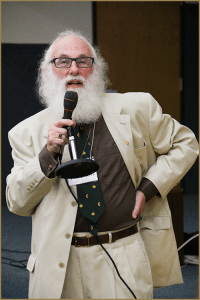By the Rev. Keith Hackett | Photos by Jesse N. Love

Since retiring three years ago Joan and I have been visiting a variety of churches for worship, both United Methodist and other denominations, and both in our community and others. Following are a few observations that hopefully may help pastors and congregations as they seek to welcome the stranger in their midst, especially when that person ventures into worship.
Part 2: “Do Not Be Bound by the Past”
There are many aspects of worship that are determined by tradition and may be stumbling block to strangers among us, and not be easy to change or adapt. One of these is the prayer that Jesus taught us.
Firstly don’t assume that everyone knows it or uses the same version. Print it in the bulletin, have it on screen, or announce where it is in the hymnbook.

Now, take a long careful look at the language and theology of this prayer, both for us as well as for the stranger.
First, language. Where and when else do we speak in Shakespearean English?
“Our Father, who art in heaven, hallowed be thy name. Thy kingdom come, thy will be done…For thine is the kingdom.”

What does it say to strangers in worship when we invite them to join us and recite archaic language? What does this say about the relevance of our message for today? Does the gospel belong to a previous century or to the 21st century? If we want to convey to the stranger that we have a 21st century gospel with a 21st century message, that is relevant today then maybe we need to look again at the words that we use to express this.
And then the theology that we verbalize week after week, probably without ever thinking about what we are saying. “And lead us not into temptation, but deliver us from evil.” Do we really believe that it is God who leads us into temptation? That it is God who sets the trap (read again the story of Abraham and Isaac in Genesis 22: 1-18) to test us? It is not the devil that made me do it, but God who led me into temptation! What does this say to the stranger about the nature of God? Is God like a father who suggests to his young child that he throw a brick through a neighbor’s window? Or like the tax lawyer who suggests that we omit some income on our tax returns? Or the spin-doctor who suggests to the politician that s/he tells the public that s/he “forgot” certain facts/events?
I, for one, do not believe this but I am asked to say it every Sunday. But what does this say to the stranger who has come to worship for the first time because a child was killed by a drunk driver; the soldier struggling with having carried out the orders of warfare; the suicidal person looking for hope; the sex offender who hasn’t yet accepted responsibility for what he/she has done?
So what can we do? Starting immediately we can use the ecumenical version of the Lord’s Prayer, MHB #894 which uses modern language and in which we accept responsibility for our actions and seek God’s help in overcoming the evil within and around us – both personal and systemic.
Almost there, but what about the opening “Our Father”? Is there a way to be true to the words of scripture and at the same time be sensitive to those who are offended by what is described as gender exclusive language? Some have suggested we begin with “Our Father -Mother” or use the Greek “Abba Amma”. Some years ago worshipping on vacation I was introduced to an opening that I have since used and commend:
“As a congregation who brings many names to the worship of God, we invite you to begin “The Lord’s Prayer” with the name you hold dear…Our…in heaven”

I invite you not to be bound by the past and try to put yourself in the shoes of the stranger and ask yourself what will help the stranger to feel comfortable in worship, and commit to following Jesus as a regular member of our worshipping community.
The Rev. Keith Hackett is a retired clergyperson in the PNWUMC.













